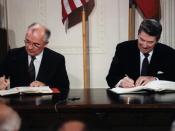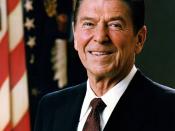The Reagan Tax Cuts and Foreign Policy
During the 1980's President Ronald Reagan's (our 40th president from 1981 to 1989) domestic policy of a substantial tax cut led to greatly increased economic prosperity for our country. During Reagan's administration marked changes were made to the tax code and economic statistics showed a major change for the better. However, at the same time, the Democrats controlled the Congress and continued increased spending against Reagan's wishes.
The Joint Economic Committee stated that an across-the-board tax cut was not new. In the 20's the Mellon tax cuts were implemented by Secretary of Treasury Andrew Mellon during the Administrations of Hoover, Harding, and Coolidge. In the 60's Kennedy introduced tax cuts. In both instances the decrease of high marginal tax rates somehow increased tax payments by the rich. Perhaps a foreshadow of things to come.
Debates were raging over the Reagan tax cuts, known as the Economic Recovery Tax Act of 1981 (or, ERTA).
This act was designed to spur savings, investment, work, and economic efficiency. This policy would impose a 25% across-the-board cut in personal marginal tax rates. In the act of decreasing marginal tax rates, and stimulating economic incentives, ERTA would increase the flow of resources into production, thus lifting economic growth. This policy received much criticism because its opponents argued that ERTA would be a giveaway to the rich, because their tax payments would collapse.
Reagan worked hard and skillfully with the congress to obtain legislation to stimulate economic growth and curb inflation, he embarked upon a course to cut taxes and curb inflation. President Reagan was able to sign into law a tax cut in late 1981 even though congressional Democrats tried to block his cuts. All tax payers received these cuts which helped to spur the economy. The cuts...


